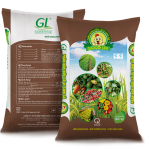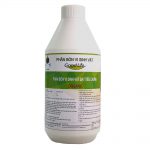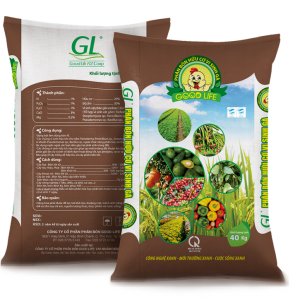Good Life Microorganism Fertilizer
Composition :
- Organic matter: ……………………. 20%
- Amino acids: ……………………….. 6%
- Protein (N): …………………………. 4%;
- Phosphorus: (P 2O ): ……………. 4%;
- Potassium: (K 2 O): ……………… 2%;
- Moisture: ……………………………. 30%;
- pH: …………………………………… ..5
Method of fertilizing: fertilizing on the roots
These are nutrition indicators registered with the Ministry of Agriculture and Rural Development, but the actual analysis results will be much higher, we will provide you with the actual analysis results if needed.
- Description
Description
Introduction
With organic content up to 20%, and an essential natural NPK source for plants and beneficial microorganisms, the product is used to stimulate rooting, improve soil structure, and provide balanced nutrition for plants.
– PRODUCTION TECHNOLOGY: Japanese technology, incubating beans with useful microorganisms.
– MAIN RAW MATERIALS INCLUDING: Bean types 90%, 45 useful microorganisms strains
– EQUIPMENT USED IN PRODUCTION: Automation 80%.
– QUALITY MANAGEMENT: According to USDA-NOP and EU organic regulation.
– PRODUCTION MANAGEMENT: ISO 9001-2015
Function
GOOD LIFE MICROOGANISM FERTILIZER is a fertilizer produced from two main sources of beans, with 45 species of microorganisms useful for soil and plants.
- Suitable for all kinds of crops, improving soil fertility and hardening caused by the use of chemical fertilizers and stimulant over a long period (the group of useful microorganisms in the fertilizer helps to convert chemical fertilizer remained in soil from indigestion to easy digestion to helps roots absorb easily, helping the soil to be porous, high water holding capacity).
- Clearly improve the quality of crop products. Increase fertility and maintain the durability of the soil.
- Less pests should minimize the polluted environment caused by plant pesticide.
- Minimize the nitrate residue in crop products after the farmer significantly reduces the use of
inorganic nitrogen.
Using guidance
Used for: Coffee, cocoa, tea, pepper, rubber, cashew, sugarcane, dragon fruit, fruit trees, leafy vegetables, fruits, vegetables,
beans, rice, corn …
– Especially very good to fertilize the plants in the flowering period and prepare for harvest.
– Depending on the cultivation regime, fertilizer from 1,500kg – 2,000kg / ha / time.
– Can be applied several times a year depending on soil and type of crops.
– Make sure to moisturize the soil right after fertilizing.
– Fertilizing before or after chemical fertilizers 5-7 days
Note: If chemical fertilizer is applied, it must be applied 7 days before or after applying organic fertilizer.
Storage: Must be stored in a cool, dry place, away from direct sunlight. Keep out of reach of children, source of food and water.






